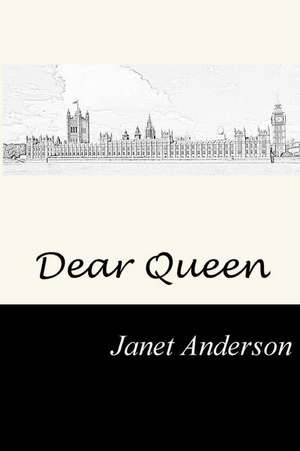Dear Queen
en Limba Engleză Paperback
Preț: 126.02 lei
Nou
Puncte Express: 189
Preț estimativ în valută:
24.11€ • 26.30$ • 20.33£
24.11€ • 26.30$ • 20.33£
Tipărit la comandă
Livrare economică 24 aprilie-08 mai
Preluare comenzi: 021 569.72.76
Specificații
ISBN-13: 9780993218385
ISBN-10: 0993218385
Pagini: 292
Dimensiuni: 152 x 229 x 17 mm
Greutate: 0.43 kg
Editura: Red Axe Books
ISBN-10: 0993218385
Pagini: 292
Dimensiuni: 152 x 229 x 17 mm
Greutate: 0.43 kg
Editura: Red Axe Books
Notă biografică
JANET ANDERSON was best known before the 1997 election campaign for suggesting that people would enjoy more sex under Labour. She was born in December 1949 in Newcastle-upon-Tyne into a family of miners and housewives. She was educated at Trowbridge girl's high school and then Kingswood Grammar in South Gloucestershire, followed by the Polytechnic of Central London and the Université de Nantes. From 1971 she worked as a secretary at The Scotsman and the Sunday Times. In 1974 she became the personal assistant to the MP for Blackburn, Barbara Castle, legendary figure in the Labour and women's movements, and worked closely with her for seven years. She performed the same role for Castle's Parliamentary successor Jack Straw until the 1987 general election when she unsuccessfully fought the marginal seat of Rossendale and Darwen. Janet became a campaigns organiser for the Parliamentary Labour Party and then the Northern regional organiser for the Shopping Hours Reform Council campaigning to extending the Sunday trading laws. She was also secretary to the Tribune Group and wrote a short biography of Barbara Castle which was published in the Dictionary of Labour Biography edited by Greg Rosen. Janet re-fought Rossendale and Darwen successfully at the 1992 election, winning by just 120 votes. She became the Parliamentary Private Secretary to the Deputy Leader of the Opposition, Margaret Beckett, a post which she held for a year. She was an opposition whip from 1994-96, before being appointed Shadow Minister for Women. While in this role she notoriously joked in an interview that women would become "more promiscuous" under a Labour government. Following the 1997 election landslide she became a junior whip in Tony Blair's new government, a job which included the title of Vice Chamberlain to the Queen. After a year before being promoted minister for Tourism, Film and Broadcasting and was responsible for bringing in the popular free TV licences for the over-75s. Anderson returned to the back benches following the 2001 election. She served on the Home Affairs and Culture, Media and Sport select committees, and the House of Commons administration committee. She was defeated in the 2010 election on an 8.9% swing to the Conservatives. She is now a consultant to the creative industry and the ACLS. She lists her pastimes as swimming, playing the piano, listening to opera, gardening and cooking Sunday roasts for her family. She speaks fluent French.
